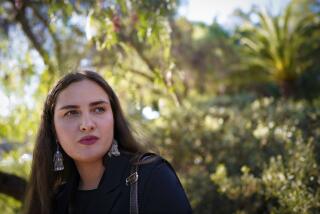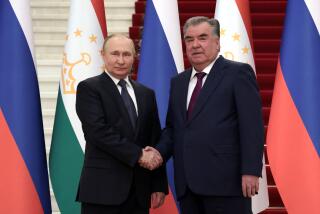Shevardnadze Optimistic on Afghan Settlement
MOSCOW — Foreign Minister Eduard A. Shevardnadze said Wednesday that he is a “confirmed optimist” about a settlement of the war in Afghanistan and the withdrawal of Soviet troops by the end of this year.
Shevardnadze, talking with reporters at a reception on the 30th anniversary of the first Soviet-American agreement for a cultural exchange, said Moscow would like to get its troops out of Afghanistan as soon as possible, once an agreement is reached to stop the fighting and shut off U.S. aid to the rebel forces.
As for the kind of government Afghanistan might have after eight years of civil war, he said that will not be up to the Soviet Union. “The people will decide,” he said. “The people are tired of war.”
While Shevardnadze broke no new ground with his remarks, his personal affirmation of Kremlin thinking on the Afghan question may have been designed to reassure skeptics in the United States about Moscow’s intentions there.
At Official Reception
The foreign minister appeared to enjoy the exchange with the press, a rare occurrence in Moscow, at a reception dotted with leading Soviet officials, cosmonauts and ballerinas from the Bolshoi Theater.
Shevardnadze said the next major step toward settlement will be taken next month at indirect talks in Geneva. Those talks, mediated by Diego Cordovez, a U.N. official, will involve Afghanistan and Pakistan, where many of the Afghan rebel units make their base.
He said he and Afghanistan’s President Najibullah have agreed that a Soviet withdrawal could be completed in no more than 12 months, and “it could be less.” Pressed to specify how much less, he said six months is too little. To a suggestion of eight or nine months, he shrugged.
About 115,000 Soviet troops are in Afghanistan supporting Najibullah’s government against insurgents.
Asked whether fighting for eight years in Afghanistan has affected Soviet thinking on the limits of projecting power beyond the Soviet borders, he smiled and said: “That is a difficult question, and we could discuss it until the early hours of the morning.”
In his opening remarks at the reception, Shevardnadze said that Soviet-American relations have had “short ups and long downs” in the past but that they now seem to be improving across the board.
U.S. Ambassador Jack F. Matlock Jr., describing the situation before the first cultural exchange agreement was signed in 1958, said he began studying Russian in 1948 but had to wait until 1961 to visit the land where it is spoken.
“There was no tourism,” he said, “no student exchanges.”
Added Shevardnadze, with mock surprise, “You don’t mean to say this was a closed country, do you?”
Matlock said the same situation had applied for Soviet citizens who wanted to come to the United States.
Shevardnadze beamed and replied: “That is a correct statement.”
More to Read
Sign up for Essential California
The most important California stories and recommendations in your inbox every morning.
You may occasionally receive promotional content from the Los Angeles Times.










